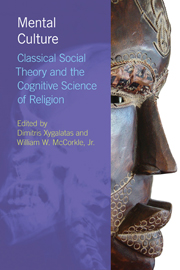Book contents
- Frontmatter
- Contents
- List of illustrations
- Contributors
- 1 Introduction: social minds, mental cultures – weaving together cognition and culture in the study of religion
- 2 Explanatory pluralism and the cognitive science of religion: why scholars in religious studies should stop worrying about reductionism
- 3 Early cognitive theorists of religion: Robin Horton and his predecessors
- 4 The opium or the aphrodisiac of the people? Darwinizing Marx on religion
- 5 Immortality, creation and regulation: updating Durkheim's theory of the sacred
- 6 Non-ordinary powers: charisma, special affordances and the study of religion
- 7 Malinowski's magic and Skinner's superstition: reconciling explanations of magical practices
- 8 Towards an evolutionary cognitive science of mental cultures: lessons from Freud
- 9 Piaget on moral judgement: towards a reconciliation with nativist and sociocultural approaches
- 10 Building on William James: the role of learning in religious experience
- 11 Explaining religious concepts: Lévi-Strauss the brilliant and problematic ancestor
- 12 The meaningful brain: Clifford Geertz and the cognitive science of culture
- 13 Cognitive science and religious thought: the case of psychological interiority in the Analects
- 14 Conclusion: moving towards a new science of religion; or have we already arrived?
- Bibliography
- Index
4 - The opium or the aphrodisiac of the people? Darwinizing Marx on religion
- Frontmatter
- Contents
- List of illustrations
- Contributors
- 1 Introduction: social minds, mental cultures – weaving together cognition and culture in the study of religion
- 2 Explanatory pluralism and the cognitive science of religion: why scholars in religious studies should stop worrying about reductionism
- 3 Early cognitive theorists of religion: Robin Horton and his predecessors
- 4 The opium or the aphrodisiac of the people? Darwinizing Marx on religion
- 5 Immortality, creation and regulation: updating Durkheim's theory of the sacred
- 6 Non-ordinary powers: charisma, special affordances and the study of religion
- 7 Malinowski's magic and Skinner's superstition: reconciling explanations of magical practices
- 8 Towards an evolutionary cognitive science of mental cultures: lessons from Freud
- 9 Piaget on moral judgement: towards a reconciliation with nativist and sociocultural approaches
- 10 Building on William James: the role of learning in religious experience
- 11 Explaining religious concepts: Lévi-Strauss the brilliant and problematic ancestor
- 12 The meaningful brain: Clifford Geertz and the cognitive science of culture
- 13 Cognitive science and religious thought: the case of psychological interiority in the Analects
- 14 Conclusion: moving towards a new science of religion; or have we already arrived?
- Bibliography
- Index
Summary
W H. Auden purportedly quipped, “We are all Freudians now.” The same could be said about Marx, who made such signal contributions to our understanding of human socio-economic life that much of what he theorized in the nineteenth century is now taken for granted. Among else Marx showed us that religiosity varies within societies along socio-economic class lines, as the rich and powerful tend to be less religious than the poor and the powerless.
Arguably the most important insight Marx offered for the study of culture is that the rich and powerful maintain their socio-economic privileges not by force alone but also by the construction and transmission of cultural myths that rationalize the status quo and disproportionately benefit the wealthy. For instance, in the past thirty years in the United States, “supply side” economic theory has dominated fiscal policy. Supply-side economic theory argues that lowering federal incomes taxes benefits society by enabling all people to keep more of their earned incomes, which they in turn spend, which creates demand, which results in more jobs.
A Marxist would argue, however, that this “low tax” story is a myth whose real effect is to disproportionately benefit the wealthy at the expense of the poor. How so? “Equal” reductions in taxes on earned income amount to more savings by those with higher earned incomes than lower incomes (e.g. a 10 per cent tax reduction in taxes paid on earnings of $200,000 nets more savings than a 10 per cent reduction in taxes paid on earnings of $20,000).
- Type
- Chapter
- Information
- Mental CultureClassical Social Theory and the Cognitive Science of Religion, pp. 52 - 65Publisher: Acumen PublishingPrint publication year: 2013



